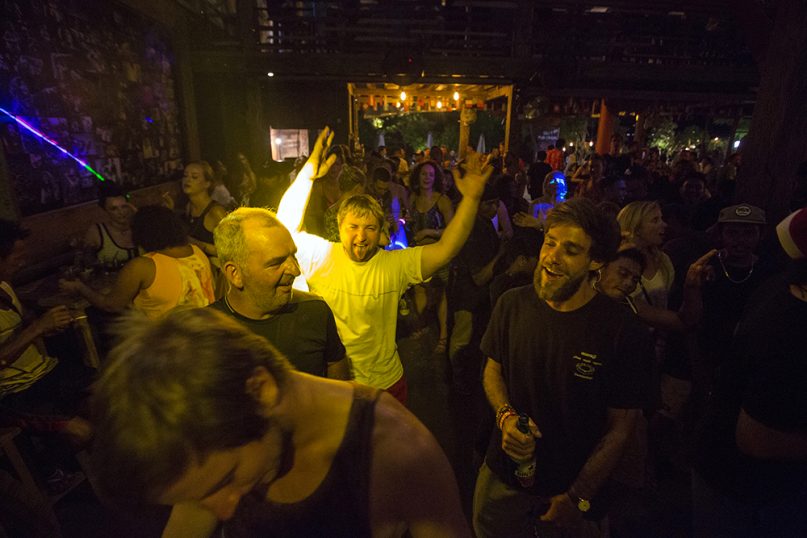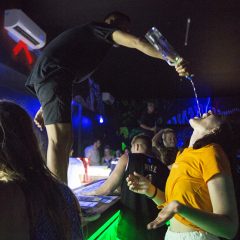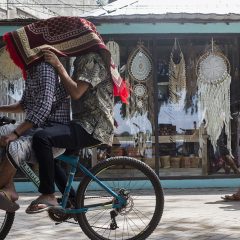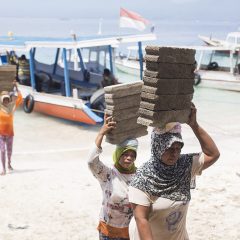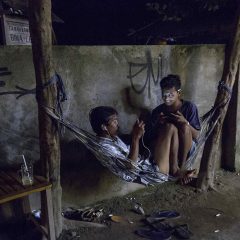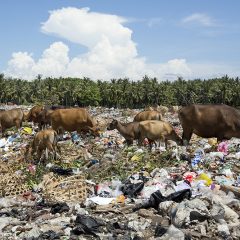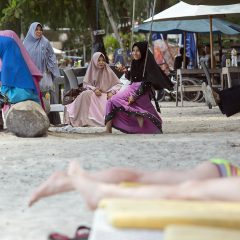(RNS) — Gili Trawangan, a tiny island in Indonesia, became famous in the 1980s as a party island, close to crowded and touristy Bali but with no police presence and hidden from the Indonesian authorities. With white beaches and pristine coral reefs, it also rapidly grew as a popular Southeast Asian diving hotspot.
Over the years the growing tourism brought in a diverse Muslim and Hindu community from Lombok, Sumbawa, Sulawesi, Bali and other neighboring islands, along with foreign investors. Now Gili Trawangan’s six square kilometers are bustling with more than 400 hostels and hotels, paved roads and considerably less nature than what it used to have.
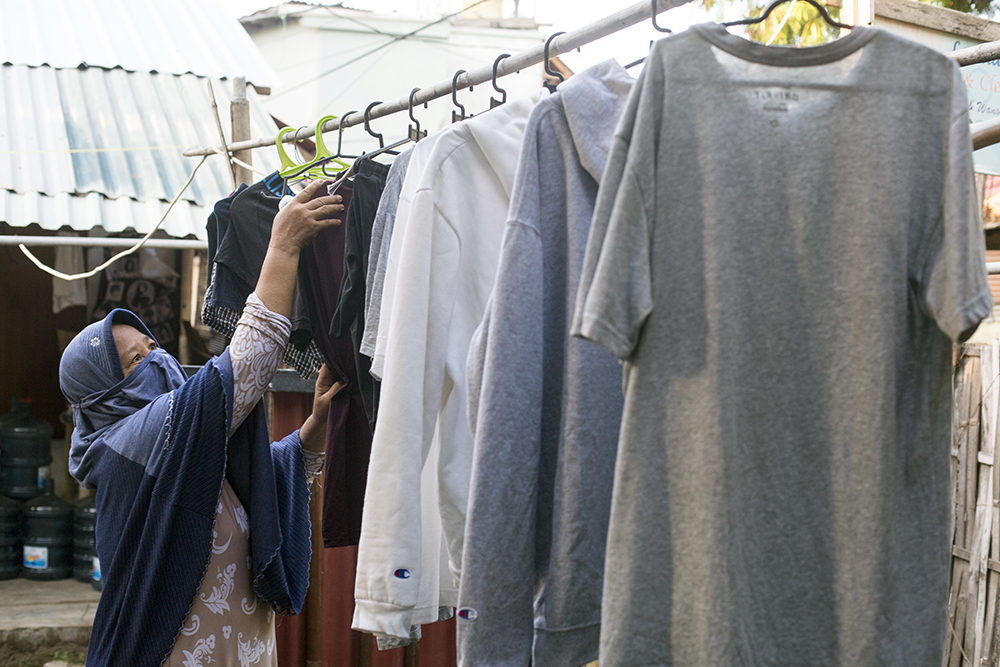
Nur, a local woman from Gili Trawangan, owns a laundry business, a small bungalow homestay and several other small businesses on the island with her family. “Many tourists come here because the local people are nice. We believe tourists are also the children of Prophet Muhammad. We can choose what business to conduct so that it matches with our beliefs,” she said. “But many Muslims here don’t think of God anymore. It should be that alcohol is sold by foreigners to foreigners, but some Muslims here think about money more than their afterlife.” RNS photo by Alexandra Radu
- A bartender pours alcohol for a partying tourist customer on Gili Trawangan. RNS photo by Alexandra Radu
- Muslim men walk on the main street of Gili Trawangan after leaving one of the three mosques on the tiny island after Friday prayers. RNS photo by Alexandra Radu
The gap between local residents’ culture and that of the tourists is wide, not only in their relative modesty and moral outlook, but in economic power. The year-rounders accommodate the several thousand tourists that flood the island every day out of necessity, while sticking to their religious lifestyle. “If we talk about tourism and our religion, for sure they do not match. They are contrary,” said Sadhi, a local who owns a homestay on the island.
Some Muslims participate in the tourist economy without directly going against their faith. “Many locals don’t sell alcohol,” Sadhi said. “They are boatsmen, they rent bikes, they sell food. For example, in our homestay we don’t sell alcohol either.”
The economy has not always relied so heavily on tourism. After serving as a base for the Japanese army in World War II, the island’s first permanent residents were inmates from an overcrowded prison on nearby Lombok Island who were sent by the Indonesian government to work on attempted coconut plantations in the 1970s. The plantations were a bust, but the locals remained, took over the land, and started businesses fueled by the incipient wave of tourists in the 1980s.
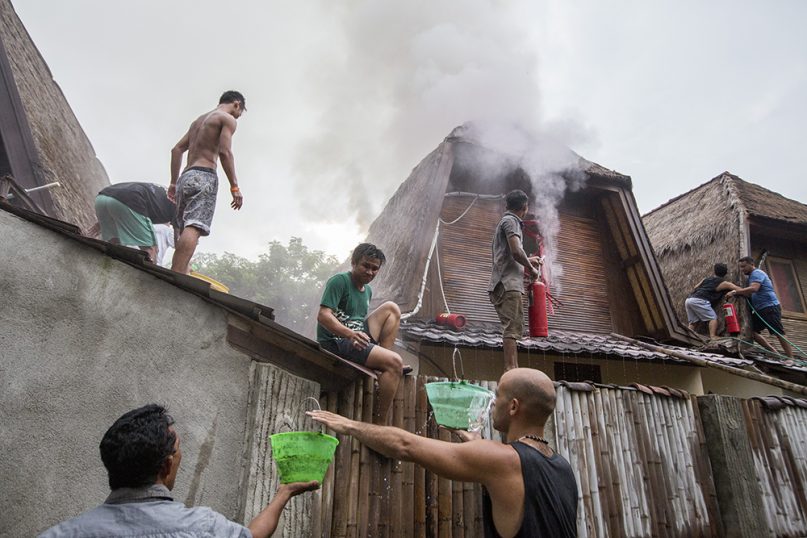
Joseph Paul Simon III, bottom right, a U.S. national living on Gili Trawangan with his family, helps put out a fire that threatened to burn down a bungalow resort near his house. Like many other foreign business owners, Joseph keeps a close relationship with the local community. “When I got here my original idea was to just deal with locals, whatever business opportunities I’m going for. Whatever is happening I want to do it in cooperation with locals, and not just in a way where I’m hiring them.” RNS photo by Alexandra Radu
- Local women carry bricks from a boat in Gili Trawangan’s harbor. In recent years, Gili has experienced a construction boom to accommodate the increasing number of tourists and renovate after the 2018 earthquake. “When I first came in 2007, there were some concrete houses but not these massive projects,” said Makie Harm van Holden, a German national living on the island. “And the restaurants were mostly made of wood. But over the years cement became sought after. It’s kind of a prestige thing.” All construction materials are brought in from the neighboring island of Lombok. RNS photo by Alexandra Radu
- Two local employees of a Gili Trawangan hostel play games on their phones in the evening in front of their work place while waiting for clients. RNS photo by Alexandra Radu
Locals tend to live on the interior, away from the beaches, where there are fewer amenities, and many struggle to fully provide for their families.
- A trash dump on Gili Trawangan island, not far from an eco resort. Around 4 tons of trash, mostly plastic and food from hotels and restaurants, are dumped here every day. The island’s cows spend their days at the dump eating leftovers. The island’s popularity and tourism has grown faster than the necessary infrastructure. RNS photo by Alexandra Radu
- Rima, a 21-month-old, takes a bath in the middle of the small street in front of her house on Gili Trawangan. Rima lives with her grandmother, Mar, 39, and a family of five. Their family first arrived in Gili in the 1990s from Central Lombok in search of a better income. “We were forced to move,” said Mar. “Back in Lombok there are no factories, no work places, all you can do is be a rice farmer. We came here looking for money.” She used to babysit children of foreign residents of the island, but after a 2018 earthquake, many resident foreigners left. Now, as many other locals, she has two of her daughters working in restaurants on the island. RNS photo by Alexandra Radu
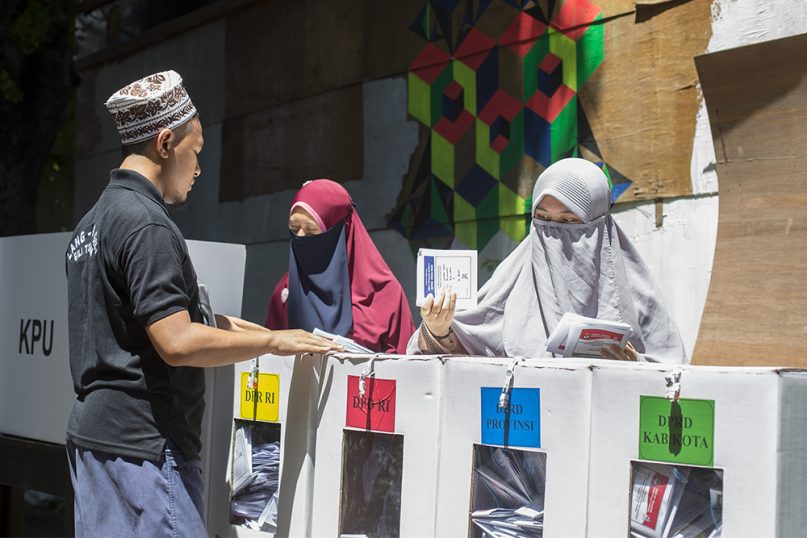
Local Gili Trawangan women vote in the Indonesian general elections at a polling station in a vacation home’s courtyard on April 17, 2019. About 192 million Indonesians voted in the election for president, parliament, regional and local government. On Gili Trawangan, many of the employees working in the hospitality businesses couldn’t vote, as they are not Gili residents and they didn’t have the time or financial resources for a trip back home to vote. RNS photo by Alexandra Radu
The island is one of the main income sources of the Indonesian Nusa Tenggara Barat Province. A 10-percent tax on those revenues is rarely returned to the locals in the form of education, healthcare or garbage collection, due to corruption and mismanagement.
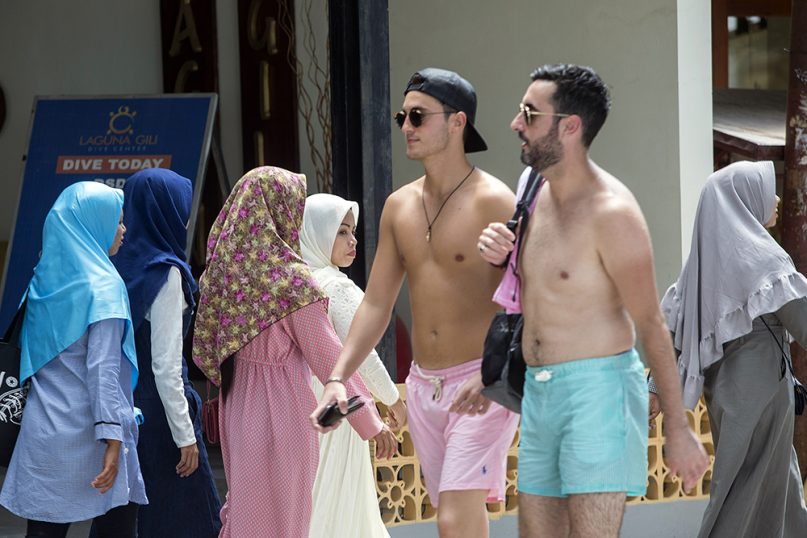
Tourist males pass Muslim women on the main street of Gili Trawangan. Many Western tourists have little to no interaction with locals and are oblivious to their impact on the island. RNS photo by Alexandra Radu
- A Muslim wedding guest poses for a photo at a beach wedding venue in Gili Trawangan. The Muslim community in the surrounding areas accepts certain aspects of the extravagant tourist culture on the island, while personally rejecting alcohol consumption and immodesty. RNS photo by Alexandra Radu
- On the weekends, a steady flow of locals from neighboring islands come to eat seafood and “to look at the naked foreigners and their crazy lifestyle,” said Dragos, owner of a homestay lodging on Gili. RNS photo by Alexandra Radu
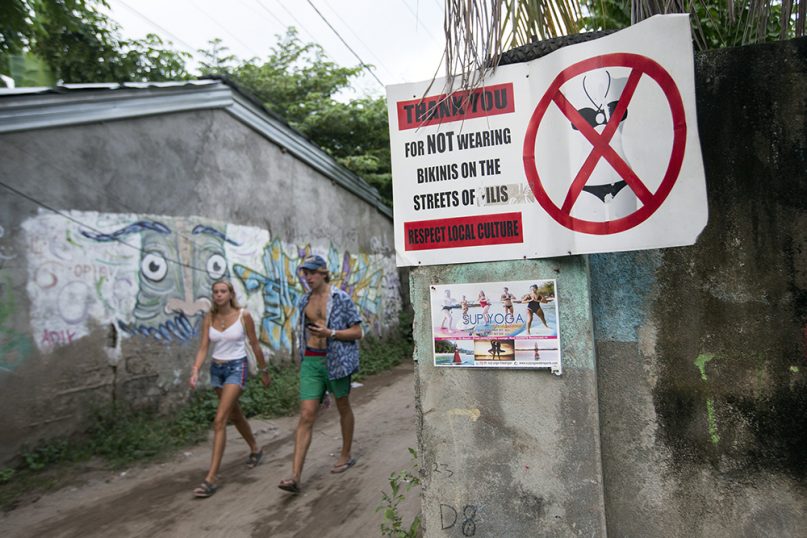
Signs advise tourists not to wear bikinis in the inner part of the island. Hotels and other tourist areas were once restricted to the beach areas, but with the increasing number of tourists over the years there are now more private rental “homestays,” restaurants and other facilities toward the center of the island. RNS photo by Alexandra Radu
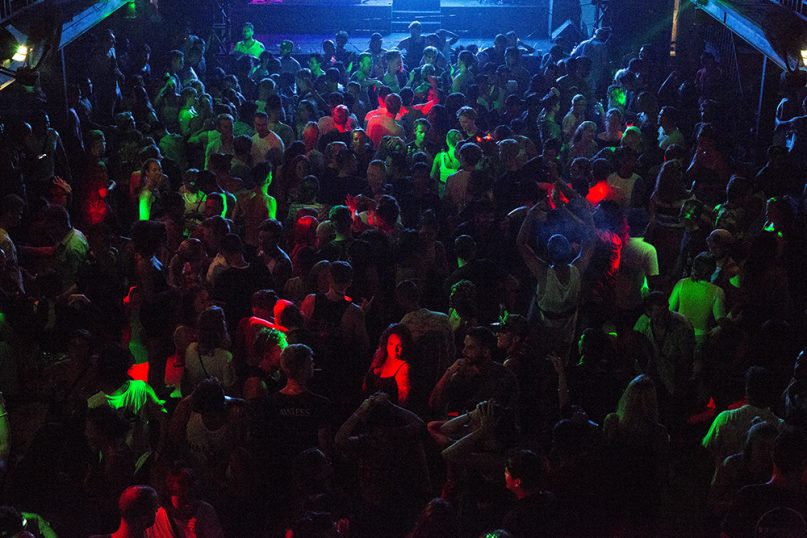
On a full moon party night in April, crowds dance at a venue. The wild full moon parties were once organized on the beach and would continue until morning, but they were deemed too loud by the local community and were toned down in recent years. RNS photo by Alexandra Radu
